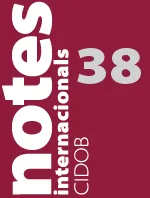North African Regions and Cities: awaiting their own spring

Notes internacionals CIDOB, núm. 38
The revolts that took place early this year in Egypt and Tunisia, which in both cases triggered the fall of the regimes, launched a transition period in which an attempt is being made to reestablish the political and juridical order of both countries. Throughout this complex constitutional process many elements must be taken into account.
The framework for the discussion regarding the reform of the States of Northern Africa and their democratic transition is a process that was already under way in some countries in the region. The popular revolts have also hastened reforms in Algeria and Morocco, where certain changes were already taking place. The transition to democracy opens up a complex periods which should replace existing dictatorships with new, more democratic and inclusive, regimes in which the political, economic, and administrative decentralisation of power toward administrations closer to the needs of the territory, municipalities, and regions could be key in assuring the success of this new stage. It is a long road on which many questions still remain to be answered. How should the constitutional process be organized? How will power be distributed in this new stage? What roles can the different actors who make up the State play? And how to pose a question that thus far has gone unnoticed: Is it possible to move toward democracy without also posing a decentralisation of power toward the territory and the citizenry, precisely the places where the demands that have brought about the regime changes were born?
To advance on this path it will be necessary to approach a structural problem that is common to the whole group of northern African countries: the scant interest of their historic leaders in promoting local and regional governance in order to improve “public services delivery, foster the consolidation of the State and of peace, develop democratic representation” from the closest area of performance. This is why, despite appearing to be a marginal issue, the role of local and regional governments in the democratic configuration of the States of Northern Africa is relevant not only because it is the physical space (municipalities and regions) where the protests are born and fueled, but also because often the same authoritarian and repressive dynamics of the central power have been reproduced at the local level, not allowing the necessary margin of authority for the inclusive development of the territories.
(...)